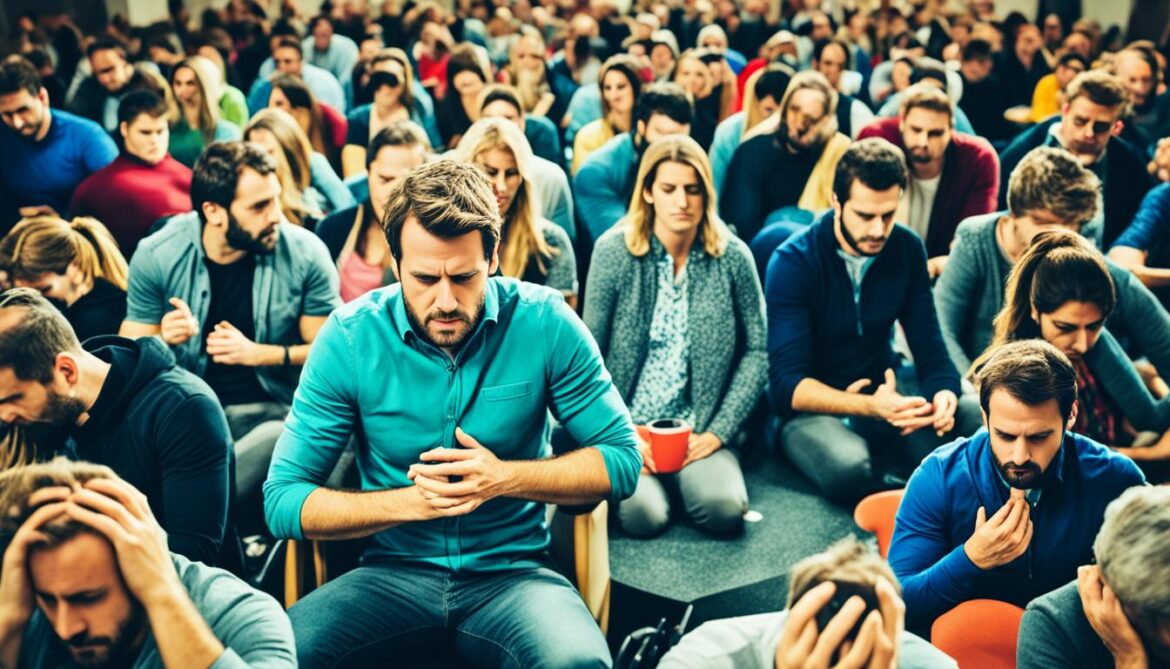Have you ever felt drained after a social event, even when you enjoyed being with friends and family? You’re not alone. Many people, especially introverts, feel mentally and physically tired of hanging out with friends. But why does this happen, and how can you deal with it?

Socializing is hard work, even for those who love being around people. Studies show that being social for over 3 hours makes some people feel really exhausted afterwards. Being worn out makes you feel grumpy and disconnected, making it hard to be social again. It’s a common feeling that introverts and extroverts experience, but introverts might feel it more because they need more time in solitude to recharge.
Understanding Social Exhaustion
Social exhaustion simply means being drained from too much social interaction. It’s like exhaustion, irritability, and unable to focus after a big party or a busy networking event. This is what happens when you experience social fatigue, a common issue for many, especially introverts, in our connected world.
Symptoms of Social Fatigue
Social exhaustion shows up in both your body and mind. Physical symptoms include being tired, getting headaches, not sleeping well, and having low energy. Psychological symptoms are about feeling irritable, unstable in emotions, and struggling to make decisions. You might also feel like you’re pulling away from others like you’re in your world.
Anxiety, depression, and needing a lot of alone time are signs of social burnout. This condition makes you feel drained, both in your mind and body, even after fun social events. Knowing the signs of social overstimulation is key to dealing with this growing problem.
Introvert burnout can hit hard, especially for introverts who recharge by being alone. Being in busy places for too long can make them feel exhausted. This makes it hard for them to keep up with their usual social life.
The Introvert’s Dilemma
Now let’s talk about introverts. As an introvert, you might face a tricky situation. You enjoy socializing and connecting. Yet, being in these situations is draining, leading to burnout. Unlike extroverts, socializing leaves you overwhelmed and tired.
This inner conflict makes it hard to decide. You want to be social but fear running out of energy. You might feel guilty for needing alone time, pull back from social events, and even isolate yourself to recharge. It’s a tough balance for many introverts.
Understanding your needs is key. As an introvert, socializing can be challenging. But with awareness and a focus on your well-being, you could succeed in both your inner and outer worlds.
- Remember, your energy is limited, even enjoyable social activities can be draining.
- Set boundaries and say no when you start feeling the signs of introvert burnout.
- Look for social interaction for introverts that feels comfortable, like small groups or one-on-one chats.
- Build a circle of introverted friends who get your needs and offer a place to recharge.
Embrace your introverted nature and find a balance between social and personal life. This way, you can handle the introvert’s dilemma with kindness towards yourself. Remember, being an introvert is a strength. It lets you deeply connect with yourself and others in unique ways that extroverts might not experience.
I Am Tired Of Hanging Out With Friends
Feeling drained by social plans is common, especially for introverts. Even if you want to be with friends, socializing is exhausting. This leaves you with little energy to follow through.
You might wish you were out with friends or family but know it would wear you down. This struggle between wanting to socialize and fearing burnout is tough.
The feeling of not having the energy to hang out often comes from social burnout. Pushing yourself too hard can make socializing stressful instead of fun. This can lead to guilt or frustration, as you want to keep your friendships but can’t find the energy.
It’s important to know this feeling is common. Many, especially introverts, struggle to balance social needs with the need for solitude. Be kind to yourself and prioritize your well-being by saying no to some social events.
Setting boundaries and being honest about your energy helps avoid social burnout. Your friends and family will get it if you need a break or prefer quieter socializing. The aim is to care for your relationships and your mental and emotional health.
Learning to manage your social energy is a journey to better fulfilment and well-being. By accepting your needs and finding ways to recharge, you can keep meaningful connections without losing yourself.
Early Signs Of Burnout
Social exhaustion doesn’t happen overnight. It’s a slow process that can sneak up on you. It’s important to notice the early signs to prevent burnout. Look out for these signs of social fatigue:
- Difficulty sleeping
- Feeling mentally unwell or emotionally drained
- Heightened reactivity and irritability
- Lack of energy and motivation
- Decreased productivity and performance
Recognizing The Warning Signs
As burnout gets worse, symptoms can worsen. You might feel hopeless, lose interest in socializing, and become detached from friends and family. You could even feel depressed. Spotting these signs early can help you act before things get worse.
Studies show women often face job burnout more than men. Jobs like healthcare, teaching, and law enforcement are especially tough and lead to burnout. Chronic stress from work can cause physical health problems like heart disease and mental health issues like anxiety and depression.
Burnout is a big deal and shouldn’t be ignored. By paying attention to the early signs of social exhaustion and taking steps to prevent it, you could keep a good balance between work and life. This way, you can enjoy your social life without the risk of burnout.
Strategies to Avoid Exhaustion
The good news however is that there are strategies to avoid exhaustion. Preventing social exhaustion and managing social fatigue needs a proactive approach. Know your triggers and set boundaries to protect your mental health. Here are some effective strategies to avoid social exhaustion:
Identify Your Triggers
Think about the social situations or events that make you feel drained. Maybe big gatherings or long periods of small talk are tough for you. Once you know your triggers, you can choose which invites to accept and which to decline.
Set Boundaries
Saying “no” can be hard, but it’s key to saving your energy. You don’t have to go to every social event. Learn to set boundaries and focus on activities that match your values and make you happy. Saying no to draining events can prevent social exhaustion.
Schedule Recharge Time
Schedule time for yourself to recharge and reconnect with your inner self. This could be an hour of quiet reflection, a peaceful walk, or a hobby you enjoy. Carving out dedicated time to rejuvenate is key to a healthy balance and avoiding social fatigue.
Pace Yourself
When you’re busy with social events, be mindful of your pace. Don’t do back-to-back events that might overwhelm you. Instead, add breaks and transition times to rest and recharge your mind and body.
By using these strategies, you can manage social fatigue, set healthy boundaries for introverts, and prevent social exhaustion. This lets you excel in social situations and keep your overall well-being.
Recovering from Social Fatigue
If you’re feeling the effects of social burnout, know you’re not alone. There are ways to bounce back and regain your energy. Several techniques can help you feel better.
Reconnect With Yourself
Feeling tired from social activities means it’s time to focus on yourself. Talk to a close friend or family member who listens well. Try mindfulness and meditation to relax and let go of stress.
Do things that make you feel good, like baking, listening to music, or being in nature. These activities can help lower stress and make you feel better.
Unplug And Recharge
Step away from social media and online chats to recharge. Writing in a journal can help you understand your feelings and find what’s causing your burnout. Remember, getting over social burnout takes time, so be patient and kind to yourself.
Using these rejuvenating techniques for introverts can help you deal with social exhaustion. Prioritizing self-care is key to getting through tough times and coming out stronger.
Embracing Introversion
And oh, as an introvert, it’s key to accept your special traits. Our society often values extroversion, but we need both types. Introverts are great listeners who value deep connections. Accepting your introversion boosts your confidence and helps you grow.
Doing things on your own can make you more independent. It also lets you recharge without feeling overwhelmed. Enjoy your choice for smaller social events and deep talks over big crowds. Introverts do well when they can think and feel before answering.
There are many perks to accepting your introversion. You can use your listening skills to build strong relationships. Your deep thinking can lead to new ideas that others might miss. Celebrate finding happiness alone and the deep bonds you make with a few close friends.
It doesn’t mean you must avoid socializing by embracing your introversion. Find a balance between being alone and being with others. Look for social activities that make you feel good, like coffee dates with one person or small gatherings. Start to step out of your comfort zone, but don’t feel forced to go to every event.
See your introversion as a strength, not a weakness. The world needs both introverts and extroverts. By embracing your unique qualities, you’ll discover the true power of being an introvert and make a big impact on others.
On A Final Note
Social exhaustion is a common issue, especially for introverts. It makes you feel drained after being around people. But don’t worry, you’re not alone in this fight.
By knowing the signs, figuring out what triggers it, and using good strategies, you can handle social fatigue. This way, you can accept and value your introverted side.
It’s key to take care of yourself, set limits, and recharge after being social. Don’t hesitate to say no to things that drain your energy. Use alone time to refresh and think. These actions will help you deal with social exhaustion and keep a good balance between being social and recharging.
So, breathe deeply, give yourself a pat on the back, and celebrate your effort to fight social fatigue. With the right mindset and methods, you can turn social exhaustion into a chance for personal growth. Embrace what makes you different, and always remember the importance of taking care of yourself.
If you liked this post you might also enjoy our blog post on Nurses Guide: 5 Top Excuses For Nurses To Call In Sick
Explore more content on our blog for additional tips and stories.



2 comments
[…] You may also be interested in this blog post Tired Of Hanging Out With Friends? 4 Foolproof Strategies To Avoid Burnout […]
[…] You may also be interested in this blog post Tired Of Hanging Out With Friends? 4 Foolproof Strategies To Avoid Burnout […]
Comments are closed.